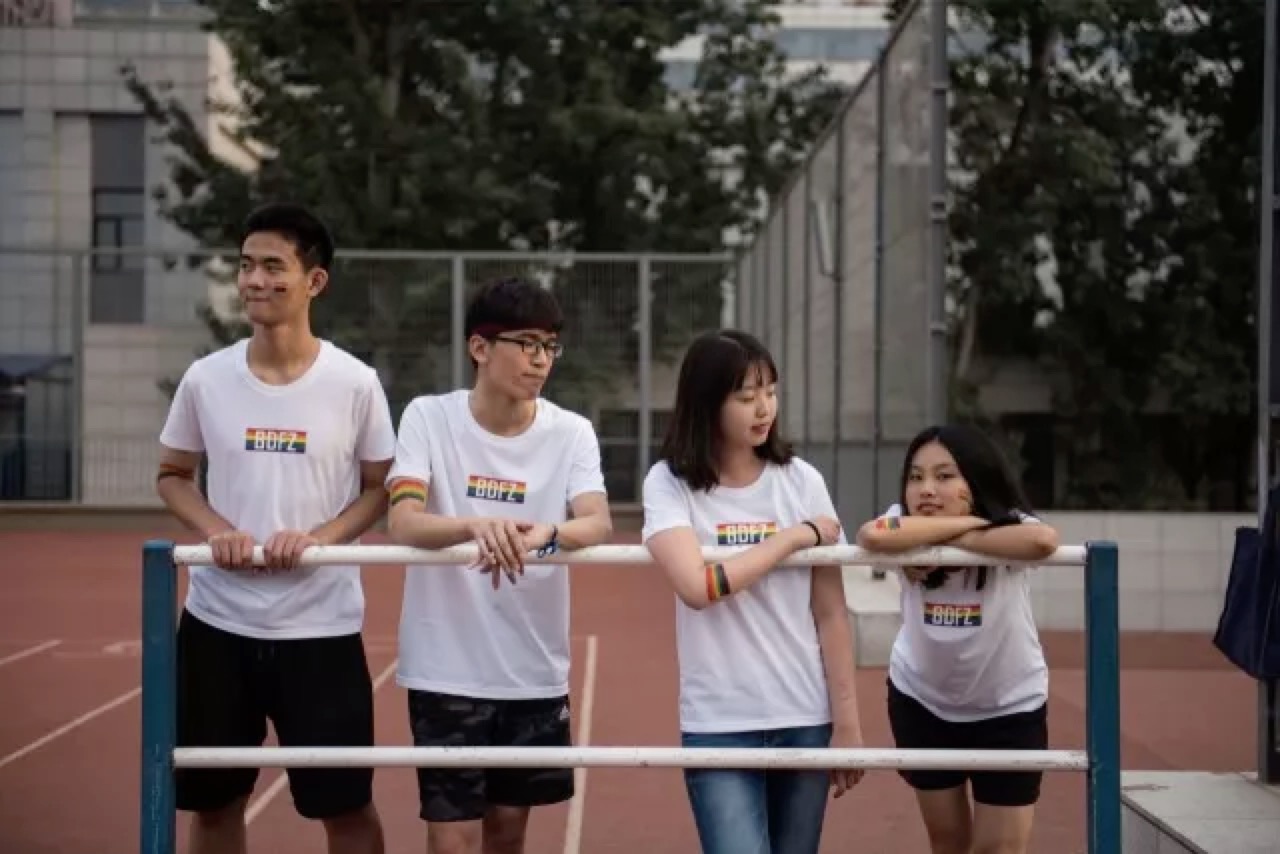Beijing high school students promote LGBT awareness with t-shirt campaign

Students at several Beijing public high schools have joined LGBT activist groups worldwide in celebrating International Day Against Homophobia, Transphobia, and Biphobia (IDAHOT) today with campaigns to sell t-shirts and raise awareness. It began on May 13, when a student organization at Affiliated High School of Peking University (北大附中, also known as BDFZ) announced on the WeChat account of Verge Magazine that it would be selling t-shirts with the rainbow pattern in an effort to promote LGBT rights.
Priced at 48 RMB ($7.50), the t-shirt features a rainbow pride banner with the letters “BDFZ” (the school’s pinyin acronym) on the front. The four authors of the WeChat article wrote: “One thing we really want to do is let everyone wear this shirt to campus on International Day Against Homophobia. No matter if you’re a member of the LGBTQ+ community or not, we want you to deliver warmth on this day, which may have special meaning to your friends.”
One of the student organizers told The China Project he found out about IDAHOT when he was an editor of a publication in middle school. “A classmate wrote an article about it, and from there I began to learn more about the LGBT community and social activism, mostly from the internet,” he said.
The LGBT community in China has recently encountered challenges while trying to promote awareness. On Sunday, LGBT supporters distributing rainbow badges at Beijing’s 798 Art Zone were accused of holding an “illegal gathering,” and there was an altercation between supporters and security guards. In April, social media website Sina Weibo banned LGBT-related content in an effort to comply with China’s cybersecurity laws. The ban received swift backlash from the Chinese public, forcing the website to reverse its decision and prompting People’s Daily, the mouthpiece of the Chinese government, to publish an article stressing that homosexuality is not an illness.
Of course, state media has always sent mixed messages. In 2016, Chinese regulators banned the depiction of homosexuality in TV productions, and prohibited online video productions from featuring “abnormal sexual behaviors,” including homosexuality. Recently, the Chinese TV distributor of the Eurovision Song Contest edited out gay elements — blurring out rainbow flags, for instance — causing the European Broadcasting Union to revoke the broadcaster’s airing rights.
The Verge Magazine WeChat article currently has 25,000 views. One alumnus commented: “During my time at BDFZ, I learned that one must not disregard human rights. The school has taught me that one should speak up for love, and approach everything with a positive and open attitude.”

Student organizations from several other public schools have initiated similar projects in concert with BDFZ. “Put on this t-shirt and support the LGBTQ+ community,” wrote organizers from the Gender and Sexuality Alliance at Beijing National Day School (北京十一学校, BNDS). “Together, we will change a world that should have been changed long ago. Gay people are also humans.”
BNDS campaign organizers say that 10 percent of the revenue will be donated to the Beijing LGBT Center, a charity organization that provides mental health consulting, HIV screening, and legal services to LGBT people in the Beijing area.
Also inspired by BDFZ’s campaign, 11th grader Pan Zehao launched a similar not-for-profit t-shirt sale at the Experimental High School Attached to Beijing Normal University (北师大实验中学, also known as SDSZ). “No More Homophobia” is the campaign’s name. Pan received 200 pre-orders within a day.
“The fundamental reasons for starting this campaign derive from my studies of post-modernism and social constructivism thoughts, as well as my own stance of gender nonconformity,” Pan said. “We hope to call attention to the structural discrimination the LGBTQIA+ group currently faces, and devote ourselves to eliminating homophobia caused by misunderstandings and stereotypes.”

School administrators have had varying reactions to the campaigns.
“[SDSZ] is actually quite liberal compared to most other Chinese high schools,” said Pan, who studies in the school’s international department, which developed its courses based on the Advanced Placement (AP) curriculum. “Although the school administration restricted usage of the school logo on the t-shirts, they granted us use of the school’s official WeChat subscription account. They encouraged students to organize on-campus activities to build their social responsibility, and they have supported student endeavors for the greater good, including on sensitive subjects like feminism and LGBT rights.”
The Beijing National Day School is widely known for its Westernized and unconventional policies. Xave G. Ho, a BNDS alum who currently studies in the U.S., told The China Project that his alma mater was very progressive. “If someone discriminates against another person’s sexual orientation, the students and faculty members would criticize him or her,” Ho said.
The BDFZ administration has been outwardly supportive of its students, officially approving the campaign proposal. Even so, the school advised one of the campaign’s organizers to not accept an interview for this story.
“BDFZ values individualism, freedom, and independence,” one student said. “After graduating from BDFZ, some alumni realize that discussions [of these topics] are often discouraged in their universities.”
As a recent example, the administration at Peking University — traditionally one of China’s more forward-thinking universities, and regarded as one of the country’s best — attempted to silence Yue Xin, a college student who drafted a petition calling upon an investigation into a sexual harassment and suicide case from the 1990s. According to Yue, the university intimated her family and persuaded her parents to ground her.
Other public high schools did not respond as favorably. March 三月社, a WeChat public account run by students of the publicly funded Beijing 101 Middle School (北京101中学), published an article claiming that the school administration rejected their proposal to sell rainbow t-shirts.
The administration said that while it respects the LGBT community, it would not allow the campaign to be held on campus. “Being your true self is more important than any form of declaration,” Beijing 101’s administrators said, as quoted in the article.
One of the organizers revealed to The China Project that a few other public schools, including the Middle School Affiliated to Beijing Jiaotong University, have responded similarly.





